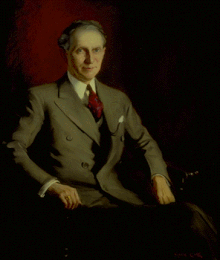Henry F. Schricker
| Henry F. Schricker | |
|---|---|

Henry F. Schricker, First Term Official Portrait
|
|
| 38th Governor of Indiana | |
|
In office January 10, 1949 – January 12, 1953 |
|
| Lieutenant |
John A. Watkins Rue J. Alexander |
| Preceded by | Ralph F. Gates |
| Succeeded by | George N. Craig |
| 36th Governor of Indiana | |
|
In office January 13, 1941 – January 8, 1945 |
|
| Lieutenant | Charles M. Dawson |
| Preceded by | M. Clifford Townsend |
| Succeeded by | Ralph F. Gates |
| 34th Lieutenant Governor of Indiana | |
|
In office January 13, 1937 – January 8, 1941 |
|
| Governor | M. Clifford Townsend |
| Preceded by | M. Clifford Townsend |
| Succeeded by | Charles M. Dawson |
| Member of the Indiana State Senate | |
|
In office 1933–1937 |
|
| Personal details | |
| Born |
August 30, 1883 North Judson, Indiana |
| Died | December 28, 1966 (aged 83) Knox, Indiana |
| Resting place |
Crown Hill Cemetery Knox, Indiana |
| Political party | Democratic |
| Spouse(s) | Maude Schricker |
| Profession | Lawyer |
| Religion | Lutheran |
Crown Hill Cemetery
Henry Frederick Schricker (August 30, 1883 – December 28, 1966) was the 36th and 38th Governor of the American state of Indiana from 1941 to 1945 and from 1949 to 1953. He is the only Indiana governor elected to two non-consecutive terms, and the only governor between 1852 and 1977 to be elected to more than one term in office. His terms were marked by strong opposition party control of the Indiana General Assembly, which attempted to remove powers from the governor that had been granted during the Great Depression. Schricker fought the attempt in the state courts, and although his power was significantly reduced, the Indiana Supreme Court ruled in the case of Tucker v. Indiana that the governor was the chief executive of the state, and the legislature could not pass legislation that interfered with the division of powers.
He was born in North Judson, Indiana, on August 30, 1883, to Bavarian immigrants Fredrick and Magdelena Gray Schricker. Schricker attended a Lutheran parochial school in North Judson to elementary school and attended a public school and completed grade eight. After graduation, he began working in his family's grocery store as a bookkeeper. His parents sent him to a local college to take a course in bookkeeping as the final step in his education. After working in the grocery store for nine years, Schricker decided to become a lawyer and worked toward that goal by taking a position in the Starke County clerk's office in Knox, Indiana.
After a year of studying law on the side, he passed the bar examination and began practing law in Knox with his mentor, Adrian Courtright. He became the cashier of the Hamlet bank in 1907.and became the owner, publisher, and editor of the Starke County Democrat in 1908. He was actively involved in the community, organizing the first Boy Scout troop in Starke County in 1912 and presiding as the chief of the Knox Fire Department. It was also during this time that Henry met Maude Brown, a teacher in North Dakota, who had originally come from Knox. In 1914, Henry visited her and persuaded her to return to Knox, resulting in their marriage on October 21, 1914. In 1919, he returned to his previous career, and became the cashier of the First National Bank of Knox.
...
Wikipedia
